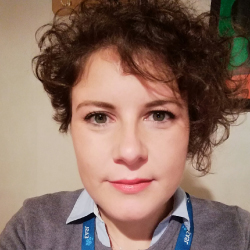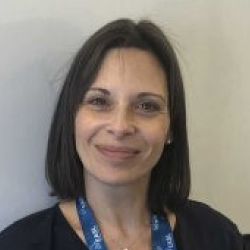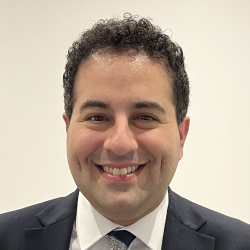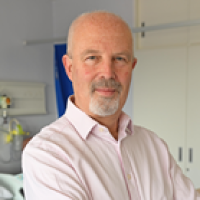Meet the organisers

Roberta Forlano
Dr Roberta Forlano is a clinical research fellow and Hepatologist at Imperial college London/Imperial college Healthcare NHS Trust. She completed a PhD in translational hepatology at Imperial college London, under the supervision of Prof Mark Thursz and Dr Pinelopi Manousou. Roberta previously obtained her MD and specialty training in Italy.
Her PhD work focused on screening strategies for Non-alcoholic fatty liver disease in primary care, microbiome characterisation and metabolic profile in NAFLD as well as the application of artificial intelligence to NAFLD diagnosis.

Pinelopi Manousou
Pinelopi Manousou is a Consultant in Hepatology and General Internal Medicine at St Mary’s Hospital, Imperial College NHS Trust. She is also a member of the board of Directors of University of Ioannina, Greece. She is the CRN co-lead for Hepatology, in NW Thames, a CRN partnership EDI member, a member of the BASL research development group and a member of the ICHNT Division of Medicine and Integrative Care Research Committee.
Dr Manousou is the Lead for the NAFLD service, including its clinical development, governance, and associated research. She has more than 79 peer reviewed publications, 6400 citations and an h-Index of 38. Her research interests are focused on the prevalence of NAFLD in the community and translational aspects of the disease. Through the group’s work in screening for NAFLD in primary care (prevalence of NAFLD in T2DM patients) – funded by EASL – they are currently establishing a screening strategy for the diabetic population in primary care. She has also set up and leading a group of Image Analysis Experts and Application Developers (European Regional Development Fund – ERDF ‘Collagen morphometric analysis in liver biopsies), whom with we have developed and installed the quantitation of liver biopsy images, with Deep Learning Image Analysis.
She is the CI of an FMT study in NASH, funded by a BRC ITMAT Grant and is setting up another study for investigating the diversity of gut microbial and metabolite/bile acid profiles between diabetic patients with and without NAFLD in different environments.

Julian Marchesi
Professor Julian R. Marchesi graduated from Cardiff University with a PhD (1992) and focused on the role bacteria play in biosystem and ecosystem function. After his Welcome Trust Fellowship he obtained a Lectureship (2001) in University College Cork and in 2015 and 2016 he was promoted to Professor of Human Microbiome Research at Cardiff University and Professor of Digestive Diseases at Imperial College London, respectively.
Currently, he is full-time at Imperial College London and his work uses poly -“omic” approaches such as metagenomics, cultureomics, metataxonomics and metabonomics to understand how the microbiota influences the initiation and treatment of NCDs, such as IBD, cancer and premature birth. He is also using Intestinal Microbiota Transplants (aka FMT) to control multi-drug resistant organisms in the intestines of patients with blood cancers, renal and urological complications.

Benjamin Mullish
Benjamin Mullish is a NIHR Academic Clinical Lecturer in the Department of Metabolism, Digestion and Reproduction at Imperial College London, and a Post-CCT clinical fellow in hepatology at St Mary's Hospital, Imperial College Healthcare NHS Trust, both London, UK.
His PhD at Imperial related to manipulation of microbiome-metabolome interactions in gut and liver diseases at Imperial College London. Ongoing work relates to use of faecal microbiota transplant as an exploratory tool in conditions including NAFLD and cirrhosis.

Debbie Shawcross
Debbie Shawcross is a Clinician Scientist and Professor in Hepatology and Chronic Liver Failure at the Institute of Liver Studies (ILS), King’s College Hospital and the James Black Centre, King’s College London. She works as a Consultant Hepatologist on the King’s Liver Unit with a specialist interest in hepatic encephalopathy and the complications of cirrhosis.
The aims of her research programme are to characterise the immunobiology of chronic liver failure focusing specifically on the gut-liver-brain axis in the context of the gut microbiome as a driver of immune dysfunction, inflammation, and encephalopathy. She is also the Chief Investigator of the NIHR-funded EME UK multicentre randomised placebo-controlled clinical trial of faecal microbiota transplantation (capsules) [PROMISE Trial] in patients with metabolic-associated and alcohol-related cirrhosis.

Mark Thursz
Mark Thursz is professor of hepatology in the Division of Digestive Diseases and Head of the Department of Metabolism, Digestion & Reproduction in the Faculty of Medicine at Imperial College London. Prof Thursz is a clinical hepatologist with inpatient beds and a clinic at St Mary’s Hospital. He was educated at King’s College London and trained in Gastroenterology and Hepatology at St Mary’s being appointed as senior Lecturer and honorary consultant in 1997.
His early research work with Howard Thomas and Adrian Hill focussed on genetic susceptibility in viral hepatitis. As an extension of this theme his research expanded to encompass the natural history of viral hepatitis and factors which determine disease progression including the role of the coagulation system in hepatic fibrogenesis. In 2011 Prof Thursz launched the Prevention of Liver Fibrosis and Cancer in Africa (PROLIFCA) programme to address barriers to control and elimination of viral hepatitis in resource limited countries. PROLIFICA has demonstrated the feasibility and cost-effectiveness of community based screening for viral hepatitis in sub-Saharan Africa and the research results have informed WHO policy.
Prof Thursz runs a translation research programme in alcohol-related liver disease. He ran the Steroids or Pentoxifylline for Alcoholic Hepatitis (STOPAH) trial which explored the utility of existing treatments for alcoholic hepatitis and is now involved in a portfolio of trials in alcohol-related liver disease. Recently granted an MRC Stratified Medicine award he is now exploring novel biomarkers for diagnosis, prognosis and risk of infection in this condition.
Prof Thursz was Secretary-General of the European Association for Study of the Liver 2011-13. He is currently Director of the Imperial College Biomedical Research Centre and Trust Research Director for Imperial College Healthcare NHS Trust.

Palak Trivedi
Dr. Trivedi is an Associate Professor at the National Institute for Health Research (NIHR) Birmingham Biomedical Research Centre (BRC), based at the University of Birmingham. Dr. Trivedi is a Consultant Hepatologist who has devoted his clinical and research career to studying chronic cholestatic liver disease, specifically primary sclerosing cholangitis (PSC) and primary biliary cholangitis (PBC).
He joined faculty at the Birmingham Liver Unit in 2018, with 50% protected research time, and currently leads the PBC and PSC clinical research programme. Dr. Trivedi is Chief Investigator for the UK-PSC consortium, and was elected chair of the British Association for Study of the Liver Special Interest Group (BASL SIG) for immune-mediated liver disease in 2018. The overarching themes of his research are in the role of gut-liver immunity, modelling the natural history of PBC and PSC, generating real-world clinical outcome data, and risk stratification pre- and post-transplantation. He is currently leading several clinical trials relating to microbiome manipulation in cholestatic liver disease, including studies relating to oral vancomycin, a randomised trial of FMT in PSC, and exploratory studies of phages and limiting bacteria-derived LPS translocation.
Assistant Faculty
- Despoina Chrysostomou
- Laura Martinez-Gili
- Blair Merrick
- Dimitris Patseas
- Lauren Roberts
- Evangelos Triantafyllou

